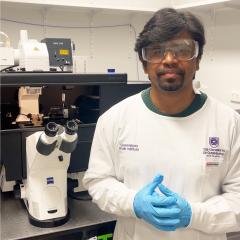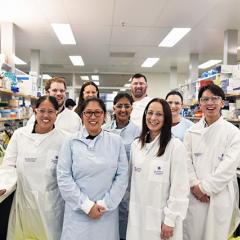
Three University of Queensland researchers have each received $1 million from the FightMND foundation for clinical trials to help fast-track potential treatments for motor neurone disease.
UQ Centre for Clinical Research and Queensland Brain Institute’s Associate Professor Robert Henderson and QBI’s Professor Perry Bartlett, along with UQ School of Biomedical Sciences Associate Professor Trent Woodruff will trial drugs that may protect motor neurons and delay progression of the disease.
Deputy Vice-Chancellor (Research) Professor Robyn Ward said the grants would support UQ researchers to find potential therapies for patients with MND.
“These translational research grants from FightMND will accelerate the work of UQ’s world-class researchers in developing treatments for this devastating disease,” Professor Ward said.
Dr Henderson will lead a phase one clinical trial testing the safety and efficacy of an immunotherapy treatment that blocks a molecule implicated in inflammation in brain cells.
The drug is being developed by the Queensland biotechnology company Implicit Bioscience Ltd, sponsor of the clinical study, with funding for the initial phase coming from the FightMND grant.
Blocking inflammation has been shown to be protective in a number of MND models.
The trial, involving a small number of patients at the Royal Brisbane and Women’s Hospital, is likely to start in the next few months.
Professor Bartlett’s research will focus on a drug that slows the progression of MND.
The drug, which blocks a protein called EphA4, will soon enter clinical trials in MND patients.
The funding will enable Professor Woodruff’s lab to accelerate safety testing of the anti-inflammatory drug PMX205, which delays the progression of MND symptoms and extends survival in animal models.
“The grant will also allow manufacture of the drug to be scaled up,” Dr Woodruff said.
“Assuming the drug is shown to be safe in pre-clinical testing, human trials could potentially start as early as 2018.”
The funding is part of a $7.8 million boost to MND research from FightMND, the foundation previously known as Cure for MND.
Media: Kim Lyell, UQ Faculty of Medicine, k.lyell@uq.edu.au, +61 7 3365 5133, +61 427 530647; Donna Lu, Queensland Brain Institute, communications@qbi.uq.edu.au, +61 405 661 856.



